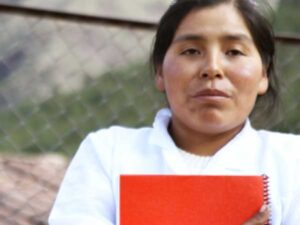Creative Capital Foundation supports underserved artists through an open call grant. The organization also provides professional development, educational programs, and workshops to artists nationwide.
Leslie Singer of Creative Capital Foundation spoke with Ashley Hopkinson on November 28, 2023. Click here to read the full conversation with insights highlighted.
Ashley Hopkinson: To start, please introduce yourself and tell me a bit about what Creative Capital was started to solve and how are you actively solving that problem.
Leslie Singer: Hi, I’m Leslie Singer, very happy to be here. I’m the Chief Operating Officer of the Creative Capital Foundation. We began in 1999 and we were founded at that moment when the National Endowment for the Arts (NEA) said they were no longer funding individual artists. It was that moment of the culture wars, which started, basically, in the early ’90s around the NEA Four, which were four artists who were supposed to get grants and then [former Senator] Jesse Helms stepped in and other politicians stepped in and said no. A lot of other things were going on at that moment and so it was also looked at as an attack on freedom of expression.
Our founding Executive Director, Ruby Lerner came together with Arch Gillies, who was the President at the Andy Warhol Foundation of Visual Arts, and fundraised for the first five years of Creative Capital’s existence. The idea being that we were going to come in and help support individual artists doing innovative, groundbreaking work. Not only were we going to give them funds, but we were also going to provide our support, our services and so forth. Really set them up for success and, really, to have artists look at themselves as the small business people and the entrepreneurs that they have to be here in the United States because there isn’t this big infrastructure of funding like if they were in Europe. That’s changed too in the last couple decades. But again, it was funding and it was around project support. It wasn’t just about giving a check and going away. Our funders, our initial funders particularly, were not interested in that, they said, “What can we do to set up artists for success?”
Ashley Hopkinson: Would you say, by and large, the majority of people who you are serving, they’re artists? Is that the audience and the clientele that you’re primarily serving?
Leslie Singer: Well, our audience is artists working in the visual arts. Film, video, moving image, people doing tech-based work, people in the performing arts, people doing performance art, people spanning all these disciplines. So, basically, it’s artists.
Ashley Hopkinson: What would you say makes Creative Capital distinctive?
Leslie Singer: Right now, we’re one of the few that do direct support to artists and we’re also doing it open call. In other words, it’s not nomination, it’s a total open submission process and we receive thousands of applications every year, as you can imagine, and then we fund 50. So, it’s pretty tough, it has to be, the project’s got to be really something special. But what we hear over and over again is there’s really very few other foundations out there funding at the level that we’re doing and funding individual artists and doing it open call.
Ashley Hopkinson: The open call, really, that is a game changer because, the programs I know about, you need sometimes a pretty big robust letter of recommendation.
Leslie Singer: You need a bunch of them. Yeah, you need a number of them. There are other big ones out there, we know the names of them but, again, to have an open call process, we hear over and over from our artists, there’s no one else out there doing what we’re doing, funding the kind of projects we fund. If projects are edgy, some of them are really dealing with the issues of today and it goes on and on. So, as we hear over and over, there’s really no one else doing it the same way we’re doing it and doing 50 awardees.
To be doing it and to be there and have the services, legal, marketing, tax advice, that kind of thing. We started doing these services in the year 2000. Now, there are a lot of people doing professional development but when we came into the marketplace, we were the first ones and we continue to do it. We also offer it to other artists, we have a platform, our curriculum platform for our website, and this is free of charge for, not just our awardees, but for all artists.
Ashley Hopkinson: Over the years of doing this kind of work, has there been any push to say, “Well, maybe this year is not an open call year.” or “Maybe this year we do fewer people.” Has that ever been a challenge or is that something that is a part of the mission of Creative Capital that you keep it open call?
Leslie Singer: We’ve always kept it open call. I don’t think there’s ever been a moment where there was like, “Okay, let’s go to nomination.” Obviously, we talk about it internally or we talk about it sometimes with our board but it’s never been a serious thing. Now, when we started out, we had a different funding cycle, we’d fund two years on and then take time off to do a big event. I think starting about 2020 or so is when we went to an annual, at that point, maybe it was 35 awardees. We have to fundraise for every dollar we give out, we are not an endowed foundation.
Ashley Hopkinson: Can you share a story of impact that illustrates the difference that this work is making?
Leslie Singer: I think every single awardee says the same thing. Different ones have said, the grant keeps them going because it’s project support, but they can also use it for rent, they can use it for health insurance, they can use it to pay themselves. We just hear over and over again about how they can’t do the work without the support. That is just key. So, I couldn’t pull out one story from out of the hundreds of people we have funded, really, it’s very consistent that they couldn’t have finished their project without it. I think our services have led to people getting better teaching jobs, to people purchasing homes, doing things to ensure their stability so we look at ourselves too as a stable influence, a stable force out there. There are 900 stories and they’re all pretty similar because artists all need the same things. They need a steady income, they need health insurance, they need a safe, comfortable place to live, an affordable place to live, it’s not rocket science. That’s actually why I’m shocked how there’s still studies being done on what artists need. It’s pretty simple what artists need, they need everything that everybody else needs.
Ashley Hopkinson: Is there a lesson learned or an insight that is really valuable that might be worth passing along from the work of Creative Capital?
Leslie Singer: I think what I said just now, that artists need a steady income, they need health insurance, just basic needs and they want to keep doing the support and work. This work that’s questioning the status quo or doing the work in their communities. I think, right now, if we had more money, we could allow people to come back in again and get funded again and again. Right now, we can only really do one project per grantee and what we’re hearing is they spend the money, they do the project and then what happens next? Where can they go next? It really isn’t there.
How do we keep supporting our artists, how do we keep supporting the work that they’re doing and doing in their communities, doing in the field, how do we keep doing it? That, I think, is the big question for us here at Creative Capital
Ashley Hopkinson: As an organization, how does Creative Capital measure success? I know the 900 awardees coming in, that’s definitely a measure of success, but what else stands out?
Leslie Singer: That’s really something we wrestle with is the KPIs [key performance indicators]. How do you measure it? You could say, well, X number of projects come to fruition and have a premier, but then you have the many projects that don’t make it but does that mean they’re not a success. The people did it and they go, “Okay, I only got this far with it.” I think, frankly, that’s something. How does one define it in numbers? I think it’s what would happen if we weren’t here. Let’s say Creative Capital ended right now, what would happen to all these artists? What would happen to all these people? Thousands of people go online and use our curriculum and so forth. To me, it’s what happens if it’s not here. Then, really, what is there?
Hundreds of artists have gone on to other things, it’s exponential. We say X number of people have been nominated for Academy Award, X number of people have gotten MacArthurs and you can say these numbers but it’s hard to measure the meaning of it all. How many people were affected by it? How many people were moved by it? That’s why it’s a little tough to put a number to it. And I think that’s why it’s tricky in the United States to get arts funding because everybody wants measurements.
Everybody’s like, “Is it this? What have you done?” and I get it. I think that’s why, when we were founded, other foundations supported us who don’t really support individual artists directly. I get why, it’s a lot of work to do it and there’s risk. You can fund somebody who has a project and, if something goes wrong with it, uh-oh. Also, it is a lot of work, just the bookkeeping and the interfacing. It’s not a neat, tidy package, because you’re dealing with people. In some ways, it’s social services. So I can understand why some don’t want to get involved in it, it can be a lot. How do you really measure the impact? It could be subtle.
Ashley Hopkinson: I like the framing of what is the world without Creative Capital because, what we experienced during the pandemic. What is the world without art, what is it without film, what is it without shows to go to?
Leslie Singer: Exactly, it’s that. During that point, again, people had come in for support to pay their rent, buy food and we’re like, “Yes, anything you need, let’s do it.” So, excuse me, we were still giving out. Obviously, they weren’t getting their projects done so they weren’t pulling all their funds but we were still getting money out to people during that time.
Ashley Hopkinson: I think every social entrepreneur, social innovator learns as much from the things that did work as the things that didn’t work, or maybe the things that didn’t work as well as you think they could.
Leslie Singer: Absolutely. You could learn more from the so-called failures as opposed to the so-called successes.
Ashley Hopkinson: Yes, exactly. What is something that maybe you’ve tried that didn’t land the way Creative Capital wanted it to? What did you learn from that?
Leslie Singer: It’s interesting. I think we’re very community based but it can be a challenge to get people to do it themselves, to get artists to gather themselves. We’ve tried it over the years and sometimes it takes, sometimes it doesn’t. It seems like there’s certain things that just take so much oversight and take more administrative interface than we have. Sometimes I feel like we just scratch the surface.
Once you get in, you’re like, “Oh, my gosh,” you’re always driving off a cliff. I think there’s a feeling, it could be a feeling of a bottomless pit of need because you get the project done, then what about the next project, what about the next one. Initially, when Creative Capital began in 1999, I had hoped that there would be a return to arts funding on the national level and that’s not happened. There are so many needs and it’s hard to get focused.
Also, we have folks who come from different backgrounds. Maybe they’re the first generation who can even think of themselves as being an artist and they don’t want to necessarily have to do something, they want to just be creative. But some people get forced into things that have to be for the good of many. I think it’s also allowing that space for creativity and I’d hope that there would’ve been more return and it hasn’t happened and I don’t think it’s going to happen in my lifetime.
Ashley Hopkinson: Outside of raising sufficient funds, because I know this is something that everybody deals with, are there any current challenges that you’re facing in the work or maybe have faced before?
Leslie Singer: There really is no federal support and there’s no state support either. We have not gotten a New York State Council on the Arts (NYSCA) grant in years. We have gotten funding from the city of New York but we now are getting emails about how their funding may be cut. But the government support hasn’t been a very big part of our budget, it’s only been a small percentage. It is usually shifted to our curriculum or professional development programs. We always talk about how we can reach the idea of individuals stepping in, wealthy individuals and corporations.
Well, you can’t do artwork critiquing climate change and critiquing the coal industry and critiquing big pharma and then think these corporations are going to pay for that art, it’s not going to happen. Wealthy individuals and, guess what, shareholders, they sit on the boards of these kinds of places. I think also, in America, we’re up against a very niche organization and we’ve had these conversations. What kind of donor, what kind of individual it has to be, someone who asserts openness. A lot of them are looking for a blue chip gallery artist, is there someone they can collect, they can make money from? Are these artists that they can buy their artwork and then sell them like they would a certificate of deposit or a stock. There are definitely philanthropists out there and family foundations, and trying to connect to them when there’s so much need. If you look at the nonprofit sector, the arts portion is so small, it’s really small.
We’re always trying to make the case why we’re important, why it’s important to fund individuals. We’re constantly having to make the case and we’ve been doing this for almost 25 years now and I feel like we’re always at ground zero trying to make the case.
Ashley Hopkinson: How has Creative Capital worked towards systems change in art? Do you feel like it’s come through some partnership or collaborating with other creative led organizations?
Leslie Singer: That’s a good question. I think there are definitely organizations and Creative Capital’s a member of them. We went into partnerships when we were part of the Artist Relief Fund coming out of COVID and, obviously, the different partnerships with our curriculum program, who’s offering them and so forth. We work with different institutions of higher education and so forth.
But I’ll be honest, we’re all competing against each other. We’re competing for the same dollars. People have tried to come together to form these partnerships and so forth and they can to a certain degree but, ultimately, at the end of the day, we’re all competitors because there’s only a certain amount going around. So, you have some other foundation who supports artists who will get the funding and a big foundation will say, “Well, we’re already funding them, we’re not going to fund you.” That’s happened to us. It’s tough. We have Giving Tuesday, we’re all blasting everybody out, give it to us. What’s going to happen is no one’s going to get anything because it’s just too overwhelming and all the artwork looks the same anyway and like, “I thought I gave to that.” Sometimes we’ll have people who will give to Creative Time who thought they gave to Creative Capital. One time we had someone who gave to us who thought they were giving to someone else. Unfortunately, because there’s not enough resources, frankly, we’re competing against each other.
Ashley Hopkinson: What is needed from other actors in the space to get that to change?
Leslie Singer: I would say it’s the funding. It’s a bottomless pit, you keep giving, giving, giving, giving. I know these foundations have to answer to their board of directors and everyone has other agendas and other things that they care about that are worthwhile or the things they’re seeking, I get it.
We have got to look at the backdrop of what we’re doing here, a lot of things are going on. Look, we have two wars raging in the world right now and we still have a lot of inequities. Look at the United States, reparations, we’ve got a lot of stuff to deal with here. We have artists dealing with all these issues, projects that deal with these issues.
Ashley Hopkinson: What have you found over the years has been the most rewarding aspect of this work? What keeps Creative Capital going?
Leslie Singer: I think all of us here have such a passion to support artists and we believe that this work is important. Many of us have backgrounds, we also have been artists or still do art and we see it is transformative. It does transform people, it is meaningful. We just can’t give up. We have to keep pushing, fighting the good fight.
You really have to believe in it. When I see the artist, I see when they fill those forms out. I see the work that they’re doing, who they’re reaching, what they’re trying to go for with their artwork and they’re saying, I don’t think they’re just saying this, we are helping them do it. So, we are impacting people’s lives in a positive way.
Ashley Hopkinson: Let’s say I wanted to do an art alliance here in New Orleans to support all the artists I know. What would be your advice if I was trying to create my own Creative Capital to support people?
Leslie Singer: I would say New Orleans has a lot of great organizations that are already there, I’d reach out to them and see what to do to help support the organizations. The infrastructure is already in place. I would say we don’t need to build any more organizations, especially New Orleans, there are tons of great organizations there. I would say reach out to who’s already there and see if you feel an affinity, affinity to them and see what one can do to support them.
Ashley Hopkinson: Yeah. A good lesson could be to plug in if there’s already an infrastructure.
Leslie Singer: Exactly because there are plenty of wonderful organizations, especially there. Again, to the partnerships I say, “God bless you all are doing great work.” When I say we’re competitors, it’s okay because I know, regionally, it’s different. We’re looked at as being New York based but, actually, we fund artists all over the United States and US artists who are living overseas as well too. But we have people that are, say, based in Berlin who we have funded. So, we look at our reach as being not just national but, on some level, international too. But I would say, if someone’s regionally focused, which I totally get, and we have funded artists that are in New Orleans too, wonderful artists who are doing things around climate change and gentrification and so forth. I would say plug into the network there, you don’t need to reinvent the wheel.
Ashley Hopkinson: That’s good advice. How do you see your work evolving over the next five years?
Leslie Singer: Wow. I think, to keep going, Christine Kuan, our Executive Director and President, just came on board as we were coming out of the pandemic. She came on board in March 2021 and she’s the one who immediately just got it. She increased the number of artists we were funding, she immediately wanted to refresh our curriculum, our professional development program. She also looked at the other events that we do and how we can refresh them. She’s constantly working around the clock, a tireless fundraiser. She’s in Atlanta now at a meeting at Spelman College, discussing what we can do with a partnership. We’ve had interns from Spelman, how can we do more things like that.
I see us continuing on, that’s the future. It’s trying to sustain ourselves, trying to make sure that we’re financially stable. We have been God blessed and we want to continue to be and just to continue to be here and to keep meeting the needs of the artists and keep funding this terrific, groundbreaking work, important work that we’ve been doing.
Ashley Hopkinson: Yeah. Well, is there anything I didn’t ask you about Creative Capital that you might want to add?
Leslie Singer: No, you’ve really been very comprehensive, I love these questions. I think I would just invite people to come to our website, www.creative-capital.org and just look through everything that we do. We have other resources like residencies and other opportunities for artists. So, we just look at ourselves as a one-stop site. The [curriculum and professional development] is open to everybody, not just our awardees.
Ashley Hopkinson: That’s wonderful. Thank you so much for talking to me today.
Click here to read the full conversation with insights highlighted.
Ashley Hopkinson is an award-winning journalist, newsroom entrepreneur and leader dedicated to excellent storytelling and mission-driven media. She currently manages the Solutions Insights Lab, an initiative of the Solutions Journalism Network. She is based in New Orleans, Louisiana.
* This interview has been edited and condensed.
Read about other insights from social innovation organizations.







